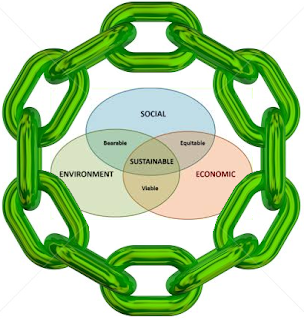Addressing supply chain issues are at the top of the list of sustainability initiatives because they represent more than half of business expenses and they are the source of around three quarters of GHG emissions. Scrutinizing upstream procurement issues is also important for downstream customers who themselves are increasingly imposing stringent standards.
Sustainable procurement involves a thorough review of what you are buying and who you are buying from. For sustainably oriented companies choosing suppliers that align with a companies values and improve overall performance can be daunting. Analyzing each link in the supply chain is a good starting point.
Suppliers should be assessed in terms of the environmental, social and economic risks they present. Environmentally oriented supply chains look at procurement with an eye to reducing carbon footprints and minimizing energy and water use. Resource efficiency is essential as we are currently using almost twice the amount of resources the earth can produce. Recycling, waste and end of life issues should also be considered throughout the supply chain.
Socially oriented supply chains focus on procurement from suppliers that respect human and labor rights and are mindful of poverty concerns. Economic considerations are about ensuring adequate margins and secure access. Other important supply chain considerations include logistics and transportation.
It is important to be prepared to learn from upstream suppliers and downstream customers. In addition to learning it is also important to share knowledge with those that could benefit.
Reassessments of suppliers should occur on a regular and ongoing basis.
Home
Uncategories
Sustainable Procurement: Environmental Social and Economic Supply Chain Considerations
- Blogger Comment
- Facebook Comment
Subscribe to:
Post Comments
(
Atom
)

0 comments:
Post a Comment